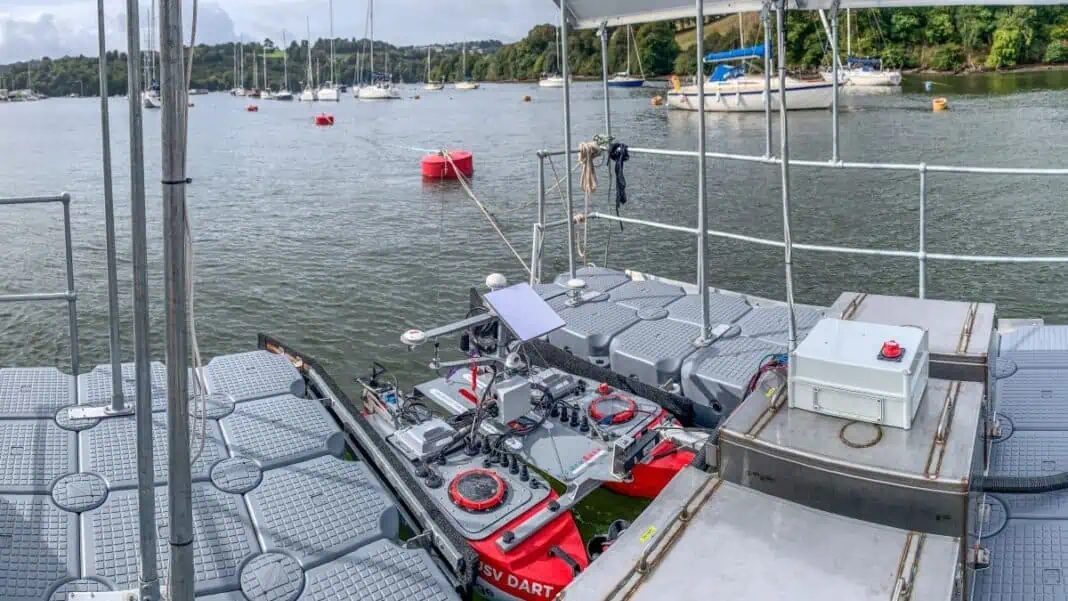HydroSurv, a global innovator in Uncrewed Surface Vessel (USV) technology, in partnership with South Devon College and BMT, has successfully completed the Remote Operations Centre (ROC) + DOCK project — a pioneering initiative to unlock the full potential of resident, zero-emission Uncrewed Surface Vessel (USV) operations in ports and harbours.
Funding by the Innovate UK Marine & Maritime Launchpad, ROC + DOCK has developed a fully integrated system that automates the deployment, recovery, recharging and retasking of USVs. This innovation removes the need for manual intervention — overcoming one of the key barriers to scalable, long-term uncrewed operations.
At the heart of the project is a solar-powered docking and replenishment station, an immersive Remote Operations Centre (ROC) using BMT’s REMBRANDT vessel simulator, and upgrades to South Devon College’s existing training vessel, USV Dart. Together, these components demonstrate an integrated end-to-end workflow that could transform how short-range environmental monitoring, inspection and surveillance missions are planned and executed – all from a centralised facility.
In early September, the ROC + DOCK system was deployed on the River Dart, where the remotely monitored docking station, fitted with an automated mooring latch, enabled fully hands-off recovery and recharging of HydroSurv’s REAV-16 USV. Deep integration between HydroSurv’s vessel control software and the BMT REMBRANDT simulator allowed the USV to be launched, navigated and tasked through a control interface traditionally used for crewed vessel training.
This capability, enabling operator training in a virtual environment that precisely replicates the vessel’s handling characteristics, before transitioning to live control; represents a significant advance in Remote Operations Centre design. It supports both the modernisation of maritime training syllabuses and the technical evolution of uncrewed operations facilities, with enhanced human factors and situational awareness at their core.
The project culminated in a live demonstration day on 16 September at the South Devon College Marine Academy, Noss-on-Dart Marina, where the integrated system was showcased to Innovate UK and invited stakeholders.
“ROC + DOCK feels both highly successful and very promising,” said Chris Marshall. “What stands out is the quality of collaboration between a commercial company and an academic institution not just as partners, but in a way that delivers real outcomes for both. South Devon College has taken its existing REMBRANDT system and, through this project, created a whole new line of activity for training and education in remote vessel operations. That’s unusual and valuable. It shows how technology can open opportunities, not take them away – making maritime operations safer, less physically demanding, and more accessible for the workforce of the future.”
By automating docking, charging, remote supervision and simulator-based training, ROC + DOCK demonstrates a practical framework for force-multiplied maritime autonomy. A two-person team can now execute multiple missions from a single facility, across dispersed coastal sites, without the need for local on-water support.
“On-water data collection can achieve extraordinary productivity once vessels are set to work,” said David Hull, Founder & CEO, HydroSurv. “The challenge lies in mobilising crew solely to launch, recover and replenish uncrewed vessels following short-duration voyages. ROC + DOCK addresses this challenge directly by enabling Uncrewed Surface Vessels to operate independently from a centralised hub, without the need to send a crew to the worksite. This approach not only reduces cost and decarbonises operations, but provides a blueprint for resident USV networks around the UK coastline.”
The project also tackles one of the sectors most pressing issues, the skills and training challenge particularly acute in emergent technologies such as Maritime Autonomous Surface Ship (MASS) operators. The REMBRANDT simulator and ROC facility create a progressive pathway, allowing operators to gain experience in a safe synthetic environment before progressing to live missions, ultimately preparing them for real world operations in challenging environments.
The project also tackles a critical industry issue – skills development in emerging maritime autonomy. Through its REMBRANDT simulator and ROC facility, South Devon College now offers a progressive training pathway, from simulated exercises through to live remote missions; building operator confidence and competence in a safe, structured environment.
Paul Singer, Business and Qualification Development Coordinator, South Devon College, commented: “Applied, hands-on learning is central to our ethos, and ROC + DOCK exemplifies how technology can be harnessed to reduce risk, improve accessibility, and prepare the workforce for the evolving demands of autonomy in maritime industries. It’s a proud moment for the College and a clear signal of where our maritime education and skills delivery is heading”
The ROC + DOCK project has demonstrated that the centralised operation of small, zero-emission Uncrewed Surface Vessels is no longer a future vision but an emerging reality – with the potential to reshape uncrewed marine data collection, inspection and monitoring for years to come.












